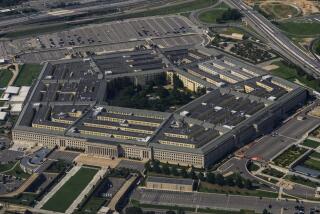Independent Counsel Has a Lonely Role
- Share via
Confusion about what we can expect of an independent counsel and what we can expect of congressional committees investigating the Iran- contras affair may start with the fact that both must begin from a common set of factual questions.
Two select committees will share with Lawrence E. Walsh, the newly appointed counsel, the responsibility for tracking down who did what, who knew of what was done, and what understandings created the sense of authority and approval that permitted lower-level officials to make decisions of presidential scope.
But beyond the “whodunit” stage the paths of prosecutors and congressional committees part. The country is entitled to fair but probing congressional hearings and reports dealing with the wisdom of selling arms to Iran, the propriety of administrative efforts to privatize support of the contras during a period when Congress had denied governmental support, and the adequacies of the structure that may have allowed very fundamental decisions to be made and then elaborately executed without presidential or Cabinet-level concurrence or, perhaps, knowledge. Walsh, as the independent counsel, can’t have much to say about these central issues. His charge is to decide whether crimes have been committed, and even egregious improprieties and stunning follies are not criminal.
This division of roles should be simple enough. But, as a country, we have a tendency to confuse a conclusion that behavior is not criminal with a judgment that it is not immoral, not improper in terms of how governmental institutions must relate to each other, and not dangerously reckless.
Even our valued traditions of liberal tolerance conspire in the same direction. In private life we have gone far (perhaps too far) toward demanding social acceptance of whatever behavior is not forbidden criminally. And then there is the tendency of our interest in resolving a mystery to overwhelm our concern about its meaning. At times of national uncertainty about who is or isn’t lying, we look to prosecutors and judges as the most reliable solution to our bewilderment about what happened, rather than as a partial answer to a problem requiring political judgment as well.
What does this mean to a newly appointed independent counsel in a situation in which important congressional hearings will parallel his investigative and prosecutorial processes? Most obvious, he must expect his task to be complicated by conflicts with congressional investigations over the availability of evidence that each needs for its own purposes. The President’s suggestion of prompt immunity for crucial witnesses before the Senate Intelligence Committee was wisely disregarded as untimely. The independent counsel deserves a decent interval to see if there is a case to be made against anyone suspected of violating a criminal statute.
There will also be conflicts over publicity, which threatens to create prejudice in any future jury at the same time that it informs a public that needs to know what has happened. On the other hand, the independent counsel’s effort to get at the facts will be aided by the parallel efforts of two other bodies.
More broadly, the independent counsel must place his responsibilities in the context of all the issues--moral, policy and structural as well as criminal--that must be explored by three bodies. In this context he has two central tasks: to find out what happened and then to decide whether anything was done that warrants prosecution. In carrying out the first task he is a valuable partner of, and check on, the new select committees whose broader judgments must start off from the same factual base. In the second task the counsel’s responsibility is a lonely one.
Walsh must address five questions: What was done by whom in the course of selling arms to Iran and of supporting the contras since 1984? Who knew of and authorized these actions? What if any part was played by violations of statutes without criminal sanctions and by deception of those who are entitled to rely on the forthrightness of executive officials handling national-security matters? What if any criminal statutes may have been violated by these steps? If the only criminal statutes applicable are very general and have never been applied in a similar context, is it fair or useful to exercise his prosecutorial discretion to bring novel charges?
This is more than a plateful of responsibility. If the independent counsel addresses each of these questions and when he makes his views public many months from now, we will all be the wiser for his efforts--whether he decides to prosecute anyone or not. There will be major questions that he leaves to be explored by the congressional committees.
That is as it should be in a democracy. The prosecutor’s responsibility is a limited one. The independent counsel’s final service to all of us, which may be more badly needed in this case than in any of the others that special prosecutors have faced, might be to remind us of the limits of his charge, to speak explicitly of the limits of criminal law itself as a device for coming to grips with issues of propriety, morality and wisdom that are central to the nation.
More to Read
Get the L.A. Times Politics newsletter
Deeply reported insights into legislation, politics and policy from Sacramento, Washington and beyond. In your inbox twice per week.
You may occasionally receive promotional content from the Los Angeles Times.










